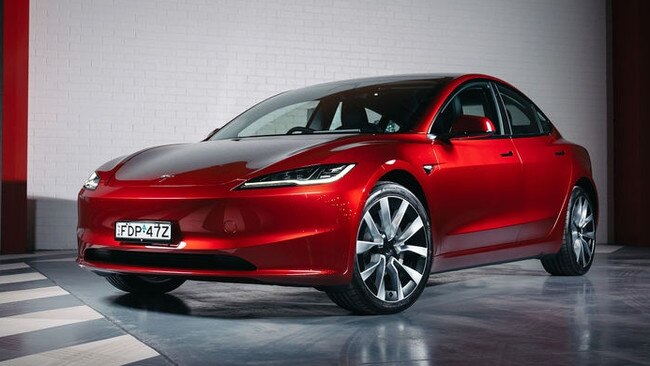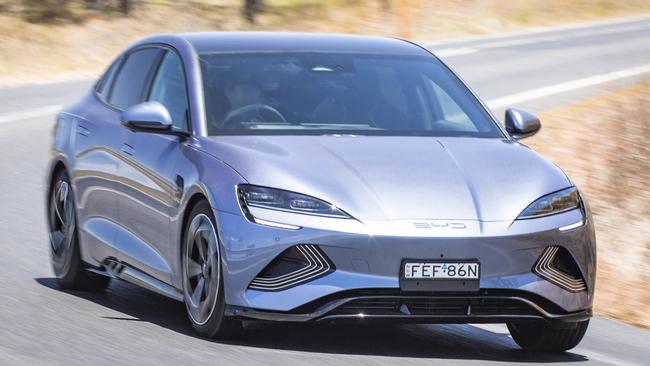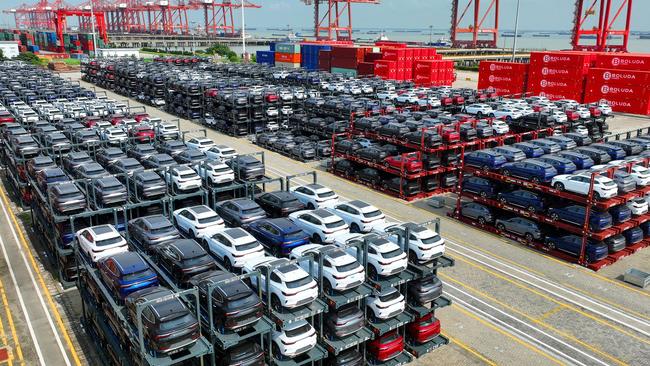The big reason not to buy an EV now
When is the right time to buy an electric car? The Osborne Effect phenomenon would argue it’s definitely not now.
Design
Don't miss out on the headlines from Design. Followed categories will be added to My News.
ANALYSIS
The hardest thing you’re going to do in the next few years is buy an EV. How do you choose? And is now the right time?
Over 87,000 people bought an EV last year and they all went through this pain. Most chose a Tesla or BYD.
Tesla sold 46,000 vehicles in 2023, over twice as many as the year before. BYD sold 12,000, six times more than the year before. Both brands have a lot going for them which is why they are dominating the market. A lot of other people bought electric MGs too.
All these people now know the strange feeling of blasting off the lights without making a sound and hitting 60 km/h before you even realise. You can put some pretty fancy cars way back in the rearview mirror – if you like doing that sort of thing.
EVs are fast and fun and you also get to feel smug. They’re expensive, sure, but you’re helping save the world!

But the big problem with EVs is what’s coming next. Why buy now when in a little while time EVs are going to be even better? You won’t feel smug for long if your EV is completely outclassed by the next generation coming out in 12 months time.
The situation is a lot like the one around 2011 when it came to smartphones. Yeah you can buy right now. But another one is coming soon that is going to make your current phone look bad. If you bought a new phone in 2011, your camera and your screen were top notch for about six months and then it was totally outclassed.
They call this the Osborne Effect. It’s a thing in consumer marketing – if people know something good is coming soon they stop buying now. Only the craziest early adopters buy something they know will be outdated ASAP.
The rate of change in technology is fast. Early adopters get to feel amazing for only a short time before something else comes out that gives them the itch to upgrade again. When it comes to phones many people had them on contracts and would update regularly. Every 12 months or two years. But for cars that’s not so easy. Short leases exist but they’re expensive and in Australia people usually own their cars outright.

The Osborne effect doesn’t last for ever. Eventually products stop changing quickly and there’s no real benefit in holding off on purchasing.
With phones, it only took a decade or so before smartphones were mature technology and one lump of iPhone was more-or-less similar to the next. There are still people who want to have the latest phone, sure, but the actual improvement in performance they get is not significant. Not like it was in the early days.
With cars, unfortunately, it will take much longer than a decade for the improvement phase to be over. In fact we’ve already had a decade of EVs and we’re still in the early days. Each generation of cars is far better than the one before.
The new Hyundai Ioniq will get back to 80 per cent charge in just 18 minutes, for example (starting charging at 10 per cent). Your $300,000 Tesla Model X can’t do that. And there’s headlines out there about new battery technology that could get that figure down to just ten minutes.
What’s more, Toyota is promising a whole new kind of battery, known as solid state. If that’s true and not just a rumour then our current generation of EVs will start to look like a joke. The solid state batteries also get back to 80 per cent charge in ten minutes, but what’s good about them is their range will be more like 1000km, not just 500km. They’ll take the charging question out of the equation for long drives – if they ever arrive.

Toyota says they will come out in 2027 or 2028, which isn’t that far away. Maybe you can nurse your old petrol car through another three years to 2027. But what if the technology doesn’t actually reach Australia until 2029 or 2030? You can’t wait that long. So do you buy a new petrol car now? Or a EV? Or try to split the difference and get a hybrid?
Hybrid sales have really taken a hit since EVs arrived on the scene. While EV sales almost tripled last year, hybrid sales rose by only 20 per cent. Last year hybrids outsold pure EVs narrowly and that will be the last time that happens. If petrol cars are history then hybrids seem to be even more so.
One big reason to buy an EV now
Resale on petrol cars, diesel cars and hybrids is getting dubious. Australia buys a million new cars each year. Most of those will end up for sale as second-hand cars in the next 10 years. But when that happens the market will be moving away from petrol and diesel. And if price and performance of EVs keeps improving the buying a second hand petrol car will only seem like a good idea if you can buy it at a screaming discount.
And even if people want petrol cars with their hearts, then it is likely the rules will make owning them harder. There could be discounts for EV registration, for example, or higher petrol taxes etc. That’s will kill the second-hand petrol car market.
If there’s a reason to buy an EV now it’s that second hand EVs are going to be pretty rare in five years. We sell 11 petrol and diesel cars now for every EV, but in ten years there’s probably going to be 11 people lined up to buy every second hand EV. Because if they’re being outclassed by the newest EVs, petrol cars will be too. It’s a very difficult time to buy a new car. I weighed up my options recently and bought a second hand petrol car that already had some of the depreciation behind it. I’m resigned to the fact tat when I sell it the market for it is not going to be that good! And my next car, I’m pretty sure, will be an EV.
Jason Murphy is an economist | @jasemurphy. He is the author of the book Incentivology.
Originally published as The big reason not to buy an EV now





